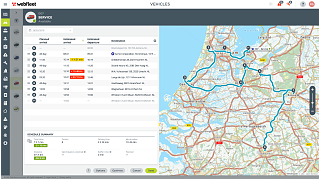





A fleet manager oversees the operational aspects of a company’s vehicle fleet. The fleet manager’s responsibilities can range from vehicle maintenance and job planning to reducing fuel costs and handling compliance. With rapid shifts in technology, the global economy and environmental regulations, fleet managers are becoming essential to a company’s strategic planning and operational efficiency.
Explore how Webfleet helps fleet managers
Fleet manager essentials
Core responsibilities of a fleet manager
A fleet manager’s main priority is ensuring that their company’s fleet runs efficiently, productively and safely. Fleet managers also strive to reduce operational costs and achieve their company’s sustainability goals. In recent years, the fleet manager’s responsibilities have evolved to take technological advancements and regulatory changes into account. For example, fleet managers are increasingly overseeing electric vehicles, which require new approaches to operational efficiency and energy use. Fleet managers are also increasingly tasked with understanding complex regulations around fleet emissions reductions.


Job requirements and qualifications
There are two main pathways to becoming a fleet manager.
- Formal education
- Some professional fleet managers earn bachelor’s degrees in business or logistics before joining a company. Others may already work in another role in transport or logistics and get certifications that help them transition into a fleet management position. Many universities across the UK offer Transportation and Logistics courses. A number of certification programmes are also available, and pricing varies by focus and provider.
- Job experience
- It’s not uncommon to start in a more entry level position for a fleet before working up to the title of Fleet Manager. To do that, it’s important to gain experiences in core skills like team leadership, organisational planning and budgeting.
Essential skills for fleet managers
Successful fleet managers draw on a variety of skills to run a fleet efficiently and effectively. Here are a few of the most important skills, all of which enable fleet managers to make informed business decisions:
- Leadership and people management
- Accounting and business administration
- Technological savvy
- Data analysis


How to become a fleet manager in Australia
Becoming a fleet manager requires taking a few steps. First, check out some job listings for fleet manager roles and see whether degrees or certifications are necessary. If formal training is required, enrol in the programme that best suits your ideal position. You could begin your educational search at an organisation which provides training for fleet drivers and managers. You could also look into Transport and Logistics programmes at universities.
Second, figure out how to develop practical experience. For example, you could start out in dispatching and work your way up to operations supervisor before applying for a fleet manager opening. Once you’re a fleet manager, be prepared to invest in ongoing training so that you and your team can stay on top of industry trends and technologies.
The evolving landscape: Key themes influencing fleet management
Fleet management functions in a dynamic business landscape, so it’s worth exploring the key themes that influence a fleet manager’s day-to-day work.
- Technology
- Technological advancements are reshaping fleet management, not to mention the transport sector as a whole. Yesterday’s spreadsheets can’t handle the speed of real-time data or zoom to vehicle locations at the street level. Advancements in telematics underscore the need for continuous adaptation to new tools and platforms.
- Financial management
- The financial aspects of fleet management encompass budgeting, cost control and utilisation. Effective budgeting ensures that resources are allocated efficiently, while cost control helps in reducing unnecessary expenses. Utilisation of vehicles and other assets is also a big factor in optimising financial performance.
- Legal responsibilities
- Legal responsibilities are expanding in the fleet management field, particularly around compliance with safety and environmental regulations. For example, fleets must adhere to drivers’ hours rules and equip their vehicles with smart tachograph devices. Legislation such as the Corporate Sustainability Reporting Directive, or CSRD, requires fleets to report on their Scope 3 emissions.
- Environmental sustainability
- The rise of sustainable forms of mobility and energy management are revolutionising fleet management. Fleets with electric vehicles know this firsthand, as they must adopt new approaches to fuel consumption, job planning and vehicle maintenance.
- Business mobility
- Business mobility impacts traditional fleet management by integrating various modes of employee transportation, including electric vehicles. The shift towards a more integrated approach enhances operational efficiency while meeting the needs of modern businesses for flexible and sustainable transportation solutions.

How Webfleet helps fleet managers
Performance tools
Track your vehicles and stay on top of maintenance tasks
Fleet analytics
Use powerful insights to help reduce your operational costs
Tailored solution
Get the best solution with a range of business integrations
Better job planning
Make customers happy with optimised routes and schedules
Simplified reporting
Track mileage on all your vehicles and prove tax compliance
Safety and security
Monitor driving behaviour, along with your trucks and assets
What’s important to you?
Webfleet helps managers simplify communication and crucial tasks. For instance, it’s possible to automate maintenance and repair schedules, reducing the risk of unplanned downtime. By integrating third-party solutions, fleet managers can maximise their existing software solutions. Webfleet’s mobile apps for fleet managers and drivers make it even easier to get daily tasks done.
Fleet visibility and maintenance
Stay up to date on vehicle conditions with greater visibility over your fleet. Webfleet automates your maintenance tasks based on time, odometer or engine hours. It also sends instant notifications about vehicle malfunctions so you can schedule repairs, reduce downtime and lower the risk of unexpected breakdowns. You can also use the vehicle check app for daily vehicle inspections.


Optimisation of complex operational costs
Webfleet gives real-time insights into fuel consumption, driving behaviour and effective route planning. With a clear dashboard view, you can take one glance at your operations to see where you can improve and reduce your fleet's overall operational costs.
Administrative time and optimal planning
Increase productivity and reduce the administrative burden across your entire organisation. Our vehicle and driver insights will help you optimise transport routes, improve delivery ETAs and save time in communication and planning. You can also integrate Webfleet with existing third-party solutions.


Customer service levels
Build stronger customer relationships and keep them updated every step of the way. Webfleet gives you the information you need to optimise scheduling, move quickly, communicate clearly and leave your customers with a good impression.
Vehicle security and driver safety
Make fleet security and driver safety a top priority. You can follow the status of your vehicles and assets through real-time tracking. Driver support is possible with instant feedback on driving behaviour through Webfleet, in combination with PRO Driver Terminals. Webfleet Video helps you increase safety and reduce claims using AI-powered dashcams.

All you need to know about fleet managers
What is the role of a fleet manager?
0
What is the role of a fleet manager?
0The primary role of a fleet manager is to ensure that the fleet runs efficiently, productively and safely. Fleet managers strive to reduce operational costs and achieve their organisations' sustainability goals, particularly with lowering C02 emissions.
What does a fleet manager do (on a daily basis)?
0
What does a fleet manager do (on a daily basis)?
0Fleet managers do a variety of tasks on a daily basis. They monitor the fleet's fuel consumption, noting trends and identifying ways to improve fuel efficiency. They also handle route planning, driver coaching/training and vehicle lifecycle management—acquisition, utilisation, disposal.
What are the responsibilities of a fleet manager?
0
What are the responsibilities of a fleet manager?
0A fleet manager is responsible for various aspects of operations, from driver retention and well-being to vehicle maintenance. They also oversee the fleet budget, manage drivers, implement safety policies and stay informed about industry regulations.
How much does a fleet manager earn?
0
How much does a fleet manager earn?
0A fleet manager’s salary is usually determined by experience level and is also influenced by the range of responsibilities. However, fleet manager salaries may vary according to region and specific industry. In Australia, fleet manager wages are often based on professional background, job location and fleet size. According to the leading recruiter website, fleet managers earn an average annual salary of $90,000 to $91,000.
What tools does a fleet manager use?
0
What tools does a fleet manager use?
0Fleet managers increasingly rely on telematics and software to tackle their workload. This typically includes a GPS system within vehicles and fleet management software to process and analyse real-time data. An integrated fleet management system simplifies administrative tasks while helping fleet managers leverage insights for strategic decision making.
Check out our fleet management features in more detail

Want to bring your fleet costs under control?

Download the eBook and find out how much you could save with the right fleet management solution.






Your consent is required
In this section, external content is being embedded from .
To display the content, your consent is required for the following cookie categories:
- Targeted Advertising
- Analytics & Personalization
- Essential
For further details, please refer to our privacy policy. If you are interested in how ###vendor_name### processes your data, please visit their privacy policy.












